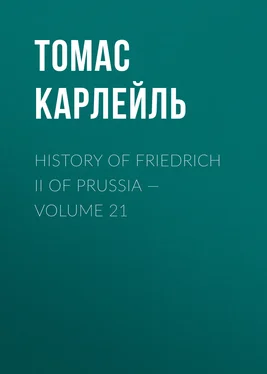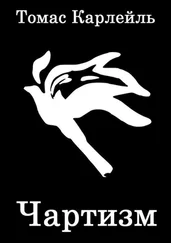Томас Карлейль - History of Friedrich II of Prussia — Volume 21
Здесь есть возможность читать онлайн «Томас Карлейль - History of Friedrich II of Prussia — Volume 21» — ознакомительный отрывок электронной книги совершенно бесплатно, а после прочтения отрывка купить полную версию. В некоторых случаях можно слушать аудио, скачать через торрент в формате fb2 и присутствует краткое содержание. Жанр: foreign_prose, История, literature_19, foreign_edu, foreign_antique, на английском языке. Описание произведения, (предисловие) а так же отзывы посетителей доступны на портале библиотеки ЛибКат.
- Название:History of Friedrich II of Prussia — Volume 21
- Автор:
- Жанр:
- Год:неизвестен
- ISBN:нет данных
- Рейтинг книги:3 / 5. Голосов: 1
-
Избранное:Добавить в избранное
- Отзывы:
-
Ваша оценка:
- 60
- 1
- 2
- 3
- 4
- 5
History of Friedrich II of Prussia — Volume 21: краткое содержание, описание и аннотация
Предлагаем к чтению аннотацию, описание, краткое содержание или предисловие (зависит от того, что написал сам автор книги «History of Friedrich II of Prussia — Volume 21»). Если вы не нашли необходимую информацию о книге — напишите в комментариях, мы постараемся отыскать её.
History of Friedrich II of Prussia — Volume 21 — читать онлайн ознакомительный отрывок
Ниже представлен текст книги, разбитый по страницам. Система сохранения места последней прочитанной страницы, позволяет с удобством читать онлайн бесплатно книгу «History of Friedrich II of Prussia — Volume 21», без необходимости каждый раз заново искать на чём Вы остановились. Поставьте закладку, и сможете в любой момент перейти на страницу, на которой закончили чтение.
Интервал:
Закладка:
"MADAM MY SISTER,—At this moment I receive a Letter from the
Empress of Russia, the contents of which do not appear to me favorable, Madam, to your hopes. She requires (EXIGE) that I should instruct my Minister in Poland to act entirely in concert with the Count Kayserling; and she adds these very words: 'I expect, from the friendship of your Majesty, that you will not allow a passage through your territory, nor the entry into Poland, to Saxon troops, who are to be regarded there absolutely as strangers.'
"Unless your Letters, Madam [Madam had said that she had written to the Empress, assuring her &c.] change the sentiments of the Empress, I do not see in what way the Elector could arrive at the throne of Poland; and consequently, whether I deferred to the wishes of the Empress in this point, or refused to do so, you would not the more become Queen; and I might commit myself against a Power which I ought to keep well with (MENAGER). I am persuaded, Madam, that your Electoral Highness enters into my embarrassment; and that, unless you find yourself successful in changing the Empress's own ideas on this matter, you will not require of me that I should embroil myself fruitlessly with a neighbor who deserves the greatest consideration from me.
"All this is one consequence of the course which Count Bruhl induced his late Polish Majesty to take with regard to the interests of Prince Karl in Courland; and your Electoral Highness will remember, that I often represented to you the injury which would arise to him from it.
"I will wish, Madam, that other opportunities may occur, where it may be in my power to prove to your Electoral Highness the profound esteem and consideration with which I am—"—F. [ OEuvres de Frederic, xxiv. 52.]
ELECTRESS TO FRIEDRICH.
"DRESDEN, 11th November, 1763.
"SIRE,—I am not yet disheartened. I love to flatter myself with your friendship, Sire, and I will not easily renounce the hope that you will give me a real mark of it in an affair which interests me so strongly. Nobody has greater ascendency over the mind of the Empress of Russia than your Majesty; use it, Sire, to incline it to our favor. Our obligation will be infinite.... Why should she be absolutely against us? What has she to fear from us? The Courland business, if that sticks with her, could be terminated in a suitable manner."—Troops into Poland, Sire?"My Husband so little thinks of sending troops thither, that he has given orders for the return of those already there. He does not wish the Crown except from the free suffrages of the Nation: if the Empress absolutely refuse to help him with her good offices, let her, at least, not be against him. Do try, Sire." [Ib. xxiv. 53.]—Friedrich answers, after four days, or by return of post—But we will give the rest in the form of Dialogue.
FRIEDRICH (after four days).... "If, Madam, I had Crowns to give away, I would place the first on your head, as most worthy to bear it. But I am far from such a position. I have just got out of a horrible War, which my enemies made upon me with a rage almost beyond example; I endeavor to cultivate friendship with all my neighbors, and to get embroiled with nobody. With regard to the affairs of Poland, an Empress whom I ought to be well with, and to whom I owe great obligations, requires me to enter into her measures; you, Madam, whom I would fain please if I could, you want me to change the sentiments of this Empress. Do but enter into my embarrassment!... According to all I hear from Russia, it appears to me that every resolution is taken there; and that the Empress is resolved even to sustain the party of her partisans in Poland with the forces she has all in readiness at the borders. As for me, Madam, I wish, if possible, not to meddle at all with this business, which hitherto is not complicated, but which may, any day, become so by the neighbors of Poland taking a too lively part in it. Ready, otherwise, on all occasions, to give to your Electoral Highness proofs of my—" [ OEuvres de Frederic, xxiv, 54: "Potsdam, 16th November, 1763."]
Electress (after ten days).... "Why should the Empress be so much against us? We have not deserved her hatred. On the contrary, we seek her friendship. She declares, however, that she will uphold the freedom of the Poles in the election of their King. You, Sire"—[Ib. xxiv. 55: "Dresden, 26th November, 1763."] But we must cut short, though it lasts long months after this. Great is the Electress's persistence,—"My poor Husband being dead, cannot our poor Boy, cannot his uncle Prince Xavier try? O Sire!" Our last word shall be this of Friedrich's; actual Election-time now drawing nigh:—
FRIEDRICH. "I am doing like the dogs who have fought bitterly till they are worn down: I sit licking my wounds. I notice most European Powers doing the same; too happy if, whilst Kings are being manufactured to right and left, public tranquillity is not disturbed thereby, and if every one may continue to dwell in peace beside his hearth and his household gods." ["Sans-Souci, 26th June, 1764" (Ib. p. 69).] Adieu, bright Madam.
No reader who has made acquaintance with Polish History can well doubt but Poland was now dead or moribund, and had well deserved to die. Anarchies are not permitted in this world. Under fine names, they are grateful to the Populaces, and to the Editors of Newspapers; but to the Maker of this Universe they are eternally abhorrent; and from the beginning have been forbidden to be. They go their course, applauded or not applauded by self and neighbors,—for what lengths of time none of us can know; for a long term sometimes, but always for a fixed term; and at last their day comes. Poland had got to great lengths, two centuries ago, when poor John Casimir abdicated his Crown of Poland, after a trial of twenty years, and took leave of the Republic in that remarkable SPEECH to the Diet of 1667.
This John is "Casimir V.," last Scion of the Swedish House of Vasa,—with whom, in the Great Elector's time, we had some slight acquaintance; and saw at least the three days' beating he got (Warsaw, 28th-30th July, 1656) from Karl Gustav of Sweden and the Great Elector, [Supra, v. 284-286.] ancestors respectively of Karl XII. and of our present Friedrich. He is not "Casimir the Great" of Polish Kings; but he is, in our day, Casimir the alone Remarkable. It seems to me I once had IN EXTENSO this Valedictory Speech of his; but it has lapsed again into the general Mother of Dead Dogs, and I will not spend a week in fishing for it. The gist of the Speech, innumerable Books and Dead Dogs tell you, [HISTOIRE DES TROIS DEMEMBREMENS does, and many others do;—copied in Biographie Universelle, vii. 278 (? Casimir).] is "lamentation over the Polish Anarchies" and "a Prophecy," which is very easily remembered. The poor old Gentleman had no doubt eaten his peck of dirt among those Polacks, and swallowed chagrins till he felt his stomach could no more, and determined to have done with it. To one's fancy, in abridged form, the Valediction must have run essentially as follows:—
"Magnanimous Polack Gentlemen, you are a glorious Republic, and have NIE POZWALAM, and strange methods of business, and of behavior to your Kings and others. We have often fought together, been beaten together, by our enemies and by ourselves; and at last I, for my share, have enough of it. I intend for Paris; religious-literary pursuits, and the society of Ninon de l'Enclos. I wished to say before going, That according to all record, ancient and modern, of the ways of God Almighty in this world, there was not heretofore, nor do I expect there can henceforth be, a Human Society that would stick together on those terms. Believe me, ye Polish Chivalries, without superior except in Heaven, if your glorious Republic continue to be managed in such manner, not good will come of it, but evil. The day will arrive [this is the Prophecy, almost IN IPSISSIMIS VERBIS], the day perhaps is not so far off, when this glorious Republic will get torn into shreds, hither, thither; be stuffed into the pockets of covetous neighbors, Brandenburg; Muscovy, Austria; and find itself reduced to zero, and abolished from the face of the world.
Читать дальшеИнтервал:
Закладка:
Похожие книги на «History of Friedrich II of Prussia — Volume 21»
Представляем Вашему вниманию похожие книги на «History of Friedrich II of Prussia — Volume 21» списком для выбора. Мы отобрали схожую по названию и смыслу литературу в надежде предоставить читателям больше вариантов отыскать новые, интересные, ещё непрочитанные произведения.
Обсуждение, отзывы о книге «History of Friedrich II of Prussia — Volume 21» и просто собственные мнения читателей. Оставьте ваши комментарии, напишите, что Вы думаете о произведении, его смысле или главных героях. Укажите что конкретно понравилось, а что нет, и почему Вы так считаете.









